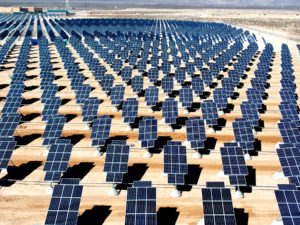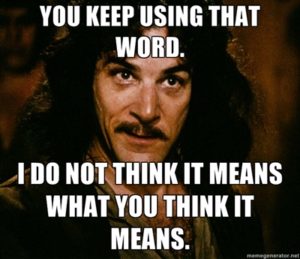I plan to install a solar array on the roof of my house.
Prior to installation, I asked a local solar expert guy to provide specific architectural plans, for my house. He provided estimates on monthly savings I could expect, based on my past energy usage as well as the specifics of my roof.
I love my spreadsheets (who doesn’t?) so I had fun calculating my ‘return on investment’ for a planned solar panel installation. I’ll mention the financial ‘return on investment’ I expect to receive a little further on in this column.
Having mentioned that I plan to install solar panels, there’s a real grumpy part of me that kind of hates the solar industry. Let me explain.
Solar Subsidies
I don’t know how much sense these industry subsidies make.
I start with an aversion to public subsidies for private gain, especially when the private gain will probably be captured by higher-income homeowners, because they are the ones who can afford to make multi-thousand dollar optional improvements to their home. Solar proponents will reply that the public gains broadly when we move toward sustainable energy and away from non-renewables. Financially, however, private households capture the monetary gain from the public subsidy, so it rubs up against one of my principles of private gain on the public dime.
Maybe even more worryingly, I have a pet theory that all the local and federal subsidies over the decades are actually inhibiting solar innovation. It’s relatively easy to read about all the ‘innovative’ solar technology coming down the pipeline. But I also kind of feel like we’ve been hearing about all this innovation since the Nixon administration, and residential solar still isn’t a good financial choice for households, if we removed all the government subsidies.
Some industries over the past forty years – think of advances in telephony, software, or computing power in that span – relentlessly innovate in a competitive market and produce stunning breakthroughs and extraordinary cost reductions. Solar power was not-quite-competitive with non-renewables in the 1970s and it’s still not-quite-competitive with non-renewables in the 2010s. Why is that? I can’t prove this, but I have a sneaking suspicion that an industry built around government subsidies will attract a different set of talents and mindsets than an industry built around market competition.
Which kind of begs the question: Are all the subsidies – in the long run – helping or hurting a faster shift to renewable energy?
I don’t mean to be overly harsh on solar power. Obviously, I’m installing it at my house. In general, I’m in favor of boosting our mix of renewable energy usage versus non-renewables, because that just makes sense. A billion years of future solar power versus even a few remaining centuries of oil & gas certainly argues for using more of the former and less of the latter.
Sustainable?
I’m a markets guy, however, and when an industry can’t become market-competitive over the years, it tends to just remain a niche player. Solar power is not yet – in a real markets sense – “sustainable.” As a markets guy I want to put on my Inigo Montoya accent to remind solar proponents who talk about solar power as “sustainable” to say “You keep using that word. I do not think it means what you think it means.”
The punchline
Ok, but can I make money installing panels at my house? I estimate that the annual return on my initial investment, after twenty-five years, would reach 6.3 percent. Theoretically, I could earn more than that, if I kept the panels installed for more than twenty-five years. On the other hand, I’ve learned the expected lifespan of the system is about twenty-five years, so it doesn’t make much sense to expect it to last longer than that, in my model.
Is that enough?
What do I think about a 6.3 percent return personally on investment in renewable energy?
It sounds about right, as a private incentive to invest my money. 6.3 percent easily beats what I can earn in a wholly ‘safe’ investment, like a bond or a money market account. It’s also a return on money above what I pay on my mortgage, so that it makes theoretical financial sense to outlay the money for solar panels, rather than just pay down my mortgage principal faster. 6.3 percent is below historical long-term returns from stock investments, but that seems ok too. With any more federal and city subsidy, my “private return on capital” might seem excessive.
Like any model, a large number of assumptions go into calculating a financial return on solar panel installation.
Assumptions
These assumptions include the following:
- I get my local utility rebate following installation as promised, which looks right now to total about 30% of the cost of installation.
- I get my 30% federal income tax rebate next year, as promised by the IRS.
- The solar production of the panels I install generate as expected.
- I use similar amounts of electricity in the future as I do now. Specific to my model, my energy needs only increase 1% per year.
- The price of energy (essentially the rates my utility charges me) only increases by 1% per year.
- The effectiveness of the panels in generating energy only degrades at 0.5% per year
- My costs of maintenance on the panels only runs about $120 per year.
- I stay in my house enough years to reap the benefits of installing panels. Specifically for my ‘annual return’ estimate, I stay in my house for twenty-five years.
If all those assumptions hold true – admittedly a pretty large set of ‘ifs’ – I’ll reap a pretty good private return on my capital.
A version of this appeared in the San Antonio Express News
Please see related posts:
Natural Gas Revolution in South Texas
Oil companies – This Makes No Sense
Post read (711) times.







2 Replies to “Solar Industry: Love it, Hate it”
We got solar panels installed about a year ago after basically winning the last round of a lottery for very generous subsidies through our utility. Combined with the federal tax credit, we look at it as a great long term investment. And yes, we were definitely cognizant of the fact that we benefit from this only because we were financially strong enough to pay cash up front for these panels. It assuages the guilt of that a little bit to know that our utility is also providing large subsidies to put solar water heaters on all Habitat for Humanity builds in our area. =/
A couple thoughts on some assumptions you might be missing:
1 – you’re assuming that the energy pricing structure will remain constant, which isn’t necessarily a safe assumption (Nevada being a particularly stark example). Over the next few years our net metering fees will go from $8/month to $12/month. Not huge, but it does eat into the savings and luckily (?) Florida isn’t generous to homeowners in terms of net metering to start with, so it can’t reasonably get too much worse.
2 – you’re assuming that if you move you wouldn’t reap any of the benefits of the remaining life of the solar panels. I’m not sure that’s true. There’s been some analysis on the $/MWh that solar brings in when it comes time to sell a house (though mostly in CA where the sample size for such analysis is larger), and it seems roughly in line with other home “upgrades”. For us, it was ~80% of the cost.
Anyhow, I hope you love your panels as much as we do.
The question of whether solar panels help resale value is something worth investigating…I suspect it doesn’t help resale value much because buyers typically do a Sqft x $/sqft of nearby comps and don’t credit very much to design and features. I’m going to start asking realtors though…